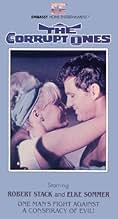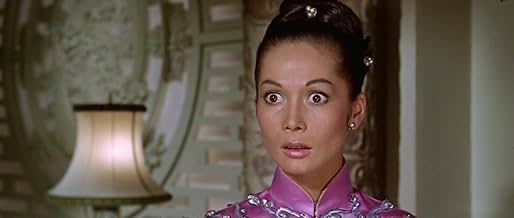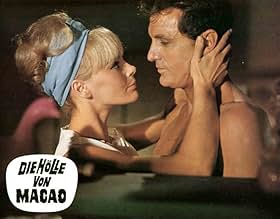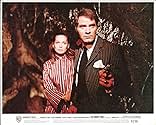CALIFICACIÓN DE IMDb
5.7/10
259
TU CALIFICACIÓN
Agrega una trama en tu idiomaSpy accidentally gets an ancient treasure. Several corrupt groups try to steal it from him.Spy accidentally gets an ancient treasure. Several corrupt groups try to steal it from him.Spy accidentally gets an ancient treasure. Several corrupt groups try to steal it from him.
- Dirección
- Guionistas
- Elenco
Hans Heyde
- Hugo
- (as Dean Heyde)
Ah Yue Lou
- Chow
- (as Ah-Yue Lou)
Rosemarie Stack
- Bar Patron
- (as Rosemary Bowe)
Heidy Bohlen
- Jasmine
- (sin créditos)
Maria Minh
- Choo Minh
- (sin créditos)
Opiniones destacadas
Nothing to add, really, to the earlier reviews except to clarify some things about the film. The location is never really stated explicitly in the film, except that it is somewhere on the border of 'Red China' where foreigners are safe. In 1967 that is either Hong Kong or Macau. Since there is legal gambling shown going on, it has to be notionally Macau. Except that I cannot detect a single scene shot in Macau. Many of the interiors look like they were done on a European sound stage as well.
All the street signs, for example, have Chinese and English text (= Hong Kong; in Macau it is Chinese and Portuguese.) There are identifiable shooting locations in Hong Kong. The opening train sequence is shot on the Kowloon-Canton Railway tracks somewhere in the vicinity of Taipo. There is a back-projected car ride down Nathan Road, Kowloon, and one can see the wall and gate of St. Andrew's Church for a second or two. Earlier, there's a car ride shot in Wanchai. There are several scenes shots in Aberdeen, and a little booth selling tickets for the "Ap Lei Chau Ferry" (this was before there was a bridge there.) Some of the waterfront/speedboat shots appear to have been done in Clear Water Bay or Sai Kung, probably because of the proximity of the Shaw Brothers Studio which might have offered some advice. Perhaps most amusing is the 'Temple of the Bells' under which the treasure is buried, which is actually the exterior of the Roman Catholic Diocesan Seminary at Wong Chuk Hang! For me it's actually these shots of a run-down but livable Hong Kong in the Vietnam War era that are most interesting, a document that preserves a lot of footage of a place that has now completely disappeared under 20 years of 'Red Chinese' rule.
All the street signs, for example, have Chinese and English text (= Hong Kong; in Macau it is Chinese and Portuguese.) There are identifiable shooting locations in Hong Kong. The opening train sequence is shot on the Kowloon-Canton Railway tracks somewhere in the vicinity of Taipo. There is a back-projected car ride down Nathan Road, Kowloon, and one can see the wall and gate of St. Andrew's Church for a second or two. Earlier, there's a car ride shot in Wanchai. There are several scenes shots in Aberdeen, and a little booth selling tickets for the "Ap Lei Chau Ferry" (this was before there was a bridge there.) Some of the waterfront/speedboat shots appear to have been done in Clear Water Bay or Sai Kung, probably because of the proximity of the Shaw Brothers Studio which might have offered some advice. Perhaps most amusing is the 'Temple of the Bells' under which the treasure is buried, which is actually the exterior of the Roman Catholic Diocesan Seminary at Wong Chuk Hang! For me it's actually these shots of a run-down but livable Hong Kong in the Vietnam War era that are most interesting, a document that preserves a lot of footage of a place that has now completely disappeared under 20 years of 'Red Chinese' rule.
This movie doesn't start out too promisingly, with a claustrophobic, ho-hum fight between two guys in a boxcar (oh boy, a fight in a boxcar!). Then, during the credits, a shot of the passing train actually includes a moment where the camera wobbles quite badly. "Oh God," I thought, "what kind of low-budget boredom am I in for?" As it turns out, the movie gathers itself like a train gathering speed, becoming more splashy, ridiculous, and rollicking as it goes along. And it is perhaps not too low-budget, either--it may not be Bond, but the sets are suitably exotic and eye-catching, with a rich, velvety decadence permeating the proceedings. Robert Stack is amusingly noxious as a freelance photographer who tries to kiss every woman who is trying to steal from him or kill him. Within seconds of meeting her. In fact, if you're a woman, he's probably trying to kiss you. That would include Elke Sommer, of course, but even more notable is Nancy Kwan, who steals the movie along with her bad guy enemy/ cohort Christian Marquand (he's the plantation owner in Apocalypse Now Redux). The plot is ridiculous, the finer points are ridiculous, and the movie would not be half as entertaining were it not so. For a movie largely known for the title track, sung by Dusty Springfield, a lot more fun than I expected.
(above is the only one of its several titles which actually reflects the nature and style of the film)
After a mediocre movie career Robert Stack finally made it big on television in "The Untouchables", after which he returned to the big screen for a second go-round, during which he appeared in this hybrid
In this one the Germans give us an unusual combination of Eurospy and "Indiana Jones" style treasure hunt, but it works well enough and is quite entertaining.
Robert is a freelance photographer who stumbles into a struggle for possession of an ancient medallion, which in turn can point the way to a hidden trove There are already four interested parties before Robert arrives on the scene, a Tong led by Nancy Kwan, a gambling gang led by Christian Marquand, Werner Peters, a corrupt police chief who can call on the manpower of the local constabulary to do his bidding, and "International Man Of Mystery" Maurizio Arena, along with his wife, Eurospy veteran Elke Sommer (perhaps the real reason behind how this movie came to be made).
Robert looks the part and brings his distinctive voice to proceedings, as well as his rather limited acting ability, but, this being a Eurospy, that is no more than par for the course and not a deal-breaker. As a romancer Robert repeatedly fails "James Bond bedroom etiquette 101". Every time a female tries to use her "womanly wiles" on him, just at the point things are about to get interesting, he always chooses to reveal to her that he knows what she's up to, which makes her angry and thus terminates the tryst. He makes the same rookie mistake with Heidi Bohlen, Nany and Elke. Now the way it's supposed to be done is, as Sean Connery or Sonny Chiba could explain to him, first you go along with the charade and bed the woman, then you tell her you know what she's up to and make her angry.
In the first two thirds of the film they do a good job of catching the flavour of Eurospy, with many colourful sets, including an elaborate bordello brothel, a casino club built atop a barge and a Tong mansion headquarters equipped with a torture chamber worthy of a Bond movie. Shades of "Get Smart" as a one piece garage door, disguised as an elaborate oriental wall panel slides slowly up and back, next, behind that, a set of wrought iron gates move aside to the left and right, revealing the torture alcove. The victim is tied to a thick wooden "T" with arms stretched out on either side, which can be pivoted up to an angle that allows the audience to see the suffering better. Then a grotesque metallic oriental demon head is lowered over the victim while acid is dripped onto them from its mouth.
Torture is something of a feature of this film, as, apart from two visits to the Tong torture chamber (first a failed henchman and later Elke), there is also some torture of Maurizio with a blow torch, and another nicely lit outdoor night torture scene, which involves dragging the Robert around the harbour behind a fizz boat. So this is a must see movie for any sadists out there.
The film is set in Macao (according to the German title, "The Hell Of Macao") but those who know identify all the location footage as being in Hong Kong. In any case it's a colonial city that borders on Mao era China.
Dusty Springfield sings the theme song, which is another plus and the music overall is good, assisting to create the appropriate mood of each scene, rather than undermining it.
The fight scenes are decently choreographed and the action is distributed evenly throughout.
The main weakness of the film is the middle third, which consists of nothing more than Robert wandering into ambush after ambush, never seeming to consider if it's an intelligent course of action. A strategy of "shaking the tree" is one thing, but wilful stupidity is another. Fortunately for him there are four sets of allies / antagonists who take turns at saving him from each other.
The final third of the movie goes full "Indy / National Treasure / Da Vinci Code" after Robert suddenly decides to make use an enormous mechanical gadget that he has clamped to a table in his hotel room, to decipher the medallion (I'm not sure what to call it, or how Robert managed to fit it in his luggage). Eventually the various interested parties pursue each other to the customary hidden cavern beneath the ancient temple and engage in the usual round of double crossing, which leads inevitably to a catastrophic cave in and the loss of all the booty.
Just time for a rom-com epilogue, where Robert, Elke (and Werner) commiserate, before running off together, frolicking toward the beach, while Dusty sings them out.
Bondesque quips
Nancy - "What are you doing?"
Robert - "You know what I'm doing, the point is, how am I doing?"
Heidi - "I don't get many visitors"
Robert - "Oh come now"
Heidi - "Well, not many that I'd like to know better"
Robert - "The least I can do is help restore your confidence"
After a mediocre movie career Robert Stack finally made it big on television in "The Untouchables", after which he returned to the big screen for a second go-round, during which he appeared in this hybrid
In this one the Germans give us an unusual combination of Eurospy and "Indiana Jones" style treasure hunt, but it works well enough and is quite entertaining.
Robert is a freelance photographer who stumbles into a struggle for possession of an ancient medallion, which in turn can point the way to a hidden trove There are already four interested parties before Robert arrives on the scene, a Tong led by Nancy Kwan, a gambling gang led by Christian Marquand, Werner Peters, a corrupt police chief who can call on the manpower of the local constabulary to do his bidding, and "International Man Of Mystery" Maurizio Arena, along with his wife, Eurospy veteran Elke Sommer (perhaps the real reason behind how this movie came to be made).
Robert looks the part and brings his distinctive voice to proceedings, as well as his rather limited acting ability, but, this being a Eurospy, that is no more than par for the course and not a deal-breaker. As a romancer Robert repeatedly fails "James Bond bedroom etiquette 101". Every time a female tries to use her "womanly wiles" on him, just at the point things are about to get interesting, he always chooses to reveal to her that he knows what she's up to, which makes her angry and thus terminates the tryst. He makes the same rookie mistake with Heidi Bohlen, Nany and Elke. Now the way it's supposed to be done is, as Sean Connery or Sonny Chiba could explain to him, first you go along with the charade and bed the woman, then you tell her you know what she's up to and make her angry.
In the first two thirds of the film they do a good job of catching the flavour of Eurospy, with many colourful sets, including an elaborate bordello brothel, a casino club built atop a barge and a Tong mansion headquarters equipped with a torture chamber worthy of a Bond movie. Shades of "Get Smart" as a one piece garage door, disguised as an elaborate oriental wall panel slides slowly up and back, next, behind that, a set of wrought iron gates move aside to the left and right, revealing the torture alcove. The victim is tied to a thick wooden "T" with arms stretched out on either side, which can be pivoted up to an angle that allows the audience to see the suffering better. Then a grotesque metallic oriental demon head is lowered over the victim while acid is dripped onto them from its mouth.
Torture is something of a feature of this film, as, apart from two visits to the Tong torture chamber (first a failed henchman and later Elke), there is also some torture of Maurizio with a blow torch, and another nicely lit outdoor night torture scene, which involves dragging the Robert around the harbour behind a fizz boat. So this is a must see movie for any sadists out there.
The film is set in Macao (according to the German title, "The Hell Of Macao") but those who know identify all the location footage as being in Hong Kong. In any case it's a colonial city that borders on Mao era China.
Dusty Springfield sings the theme song, which is another plus and the music overall is good, assisting to create the appropriate mood of each scene, rather than undermining it.
The fight scenes are decently choreographed and the action is distributed evenly throughout.
The main weakness of the film is the middle third, which consists of nothing more than Robert wandering into ambush after ambush, never seeming to consider if it's an intelligent course of action. A strategy of "shaking the tree" is one thing, but wilful stupidity is another. Fortunately for him there are four sets of allies / antagonists who take turns at saving him from each other.
The final third of the movie goes full "Indy / National Treasure / Da Vinci Code" after Robert suddenly decides to make use an enormous mechanical gadget that he has clamped to a table in his hotel room, to decipher the medallion (I'm not sure what to call it, or how Robert managed to fit it in his luggage). Eventually the various interested parties pursue each other to the customary hidden cavern beneath the ancient temple and engage in the usual round of double crossing, which leads inevitably to a catastrophic cave in and the loss of all the booty.
Just time for a rom-com epilogue, where Robert, Elke (and Werner) commiserate, before running off together, frolicking toward the beach, while Dusty sings them out.
Bondesque quips
Nancy - "What are you doing?"
Robert - "You know what I'm doing, the point is, how am I doing?"
Heidi - "I don't get many visitors"
Robert - "Oh come now"
Heidi - "Well, not many that I'd like to know better"
Robert - "The least I can do is help restore your confidence"
Perhaps Mr. Spielberg found his inspiration for Indiana Jones not only in "That Man from Rio" (1964), but also in this "The Corrupt Ones" (1967). Elke Sommer and Nancy Kwan are the most important assets of the film. Neither Robert Stack, Werner Peters and Christian Marquand, they are not bad at all, on the contrary. The film has rhythm, is well done, in all respects. The most exciting, original and ingenious scene is when Stack is tied up with a rope, attached to a motor boat and dragged through the sea, to be made to talk. I'm a big fan of Elke Sommer too (especially due to "Deadlier Than the Male" made in
the same year 1967) but here, Nancy Kwan is the sweetest, sexy, cool, etc.
I guess that "Die Holle von Macao" (called "The Corrupt Ones" in the US) is the sort of movie that you can only find in Movie Madness here in Portland. Cliff Wilder (Robert Stack) is an American spy in Hong Kong who gets hold of an ancient medallion and finds himself the target of various and sundry groups. His only escape is gorgeous Lilly Mancini (Elke Sommer). Meanwhile...
Oh come on folks. THIS IS AN ELKE SOMMER MOVIE!!!!!!!!! You don't watch this sort of movie to have a life-changing experience; you watch it to see her, uh, features. Some people may claim that this movie's just trying to be a James Bond movie. SO WHAT?!!!!!!! It's Elke Sommer, people! Who cares about a decrepit old right-winger like Robert Stack dodging bullets when you've got her hot features on the screen? I know. You say that my infatuation with her is inane, immature, pathetic, and non-respectable, given that she mostly starred in skin flicks in the '60s and hasn't done much since then. Well too bad. I've always found her hotter than the likes of Julia Roberts. In fact, that's why I gave this movie 5/10 stars: the plot is pretty routine, but her presence makes it worthwhile. If I was going to make a movie, I'd do everything possible to try and get her a role, even if it was the same kind of role with which she's always been associated. Hubba hubba...
Oh come on folks. THIS IS AN ELKE SOMMER MOVIE!!!!!!!!! You don't watch this sort of movie to have a life-changing experience; you watch it to see her, uh, features. Some people may claim that this movie's just trying to be a James Bond movie. SO WHAT?!!!!!!! It's Elke Sommer, people! Who cares about a decrepit old right-winger like Robert Stack dodging bullets when you've got her hot features on the screen? I know. You say that my infatuation with her is inane, immature, pathetic, and non-respectable, given that she mostly starred in skin flicks in the '60s and hasn't done much since then. Well too bad. I've always found her hotter than the likes of Julia Roberts. In fact, that's why I gave this movie 5/10 stars: the plot is pretty routine, but her presence makes it worthwhile. If I was going to make a movie, I'd do everything possible to try and get her a role, even if it was the same kind of role with which she's always been associated. Hubba hubba...
¿Sabías que…?
- TriviaHeidy Bohlen's debut.
- Citas
Cliff Wilder: Thanks.
Danny: For what? It's my boat I was looking after, not you.
Cliff Wilder: That figures.
- ConexionesReferenced in The Hotel New Hampshire (1984)
Selecciones populares
Inicia sesión para calificar y agrega a la lista de videos para obtener recomendaciones personalizadas
Detalles
- Fecha de lanzamiento
- Países de origen
- Idioma
- También se conoce como
- The Corrupt Ones
- Locaciones de filmación
- Productoras
- Ver más créditos de la compañía en IMDbPro
- Tiempo de ejecución1 hora 33 minutos
- Mezcla de sonido
- Relación de aspecto
- 2.35 : 1
Contribuir a esta página
Sugiere una edición o agrega el contenido que falta

Principales brechas de datos
By what name was El medallón de Pekín (1967) officially released in India in English?
Responda




























